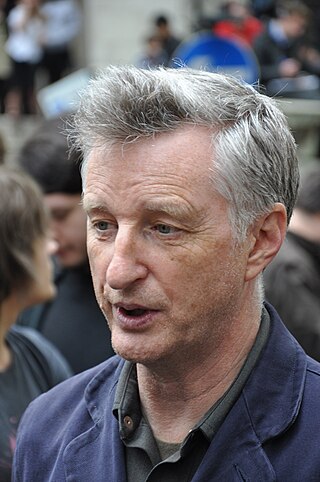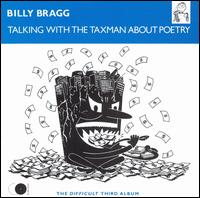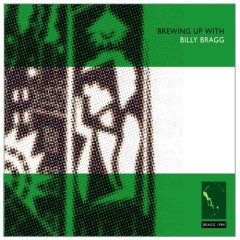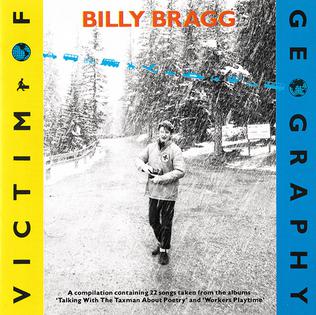Further reading
- "Re-Signing Mass Culture: Billy Bragg's 'There is Power in a Union'", by Timothy D. Taylor, in Popular Music and Society, volume 15, issue 2, 1992 [17]
| "There Is Power in a Union" | |
|---|---|
| Song by Billy Bragg | |
| from the album Talking with the Taxman About Poetry | |
| Language | English |
| Published | 1986 |
| Studio | Livingston Studios, Wood Green, London |
| Length | 2:48 |
| Composer(s) | George Frederick Root |
| Lyricist(s) | Billy Bragg |
| Producer(s) | Kenny Jones, John Porter |
"There Is Power in a Union" is a song written by Billy Bragg and first released on his 1986 Talking with the Taxman About Poetry album. It is set to the tune of George Frederick Root's "Battle Cry of Freedom". [1]
It has become known as an anthem of the trade union movement, [2] [3] and has been played live by Bragg both as part of concert sets [4] [5] and on trade union picket lines. [6] It has also featured prominently in films, including as the finale of 2014's Pride . [7]
It shares its title with an otherwise unrelated 1913 song by Joe Hill.
The song was first released on Bragg's 1986 Talking with the Taxman About Poetry album. [8]
He re-recorded the song with The Pattersons for his 1988 EP Help Save the Youth of America (Live and Dubious). [9]
Versions of the song feature on Bragg compilations Victim of Geography , Must I Paint You a Picture? The Essential Billy Bragg and Volume 1 , and live recordings Best of Billy Bragg at the BBC 1983 – 2019, and Live at the Union Chapel, London. [10] In 2023 it was selected as one of 40 tracks from his career to appear on the "Roaring Forty" retrospective box set. [11]
The song has been covered by punk band Street Dogs (with altered lyrics) on their album Fading American Dream , [12] and by the GC5 on their 2002 Singles Collection (1997–2000). [13]
The song is featured in the 2004 film Howard Zinn: You Can't Be Neutral on a Moving Train in which American Communist organizations march in Times Square. [14]
The song is featured prominently as the finale to the 2014 film Pride , about London organization Lesbians and Gays Support the Miners support for striking miners of a Welsh pit village during the UK miners' strike (1984–85). [7] [15]
US band Dropkick Murphys play the song immediately before their performances. [16]

Stephen William Bragg is an English singer, songwriter, musician, author and political activist. His music blends elements of folk music, punk rock and protest songs, with lyrics that mostly span political or romantic themes. His activism is centred on social change and left-wing political causes.

The 1984–1985 United Kingdom miners' strike was a major industrial action within the British coal industry in an attempt to prevent closures of pits that the government deemed "uneconomic" in the coal industry, which had been nationalised in 1947. It was led by Arthur Scargill of the National Union of Mineworkers (NUM) against the National Coal Board (NCB), a government agency. Opposition to the strike was led by the Conservative government of Prime Minister Margaret Thatcher, who wanted to reduce the power of the trade unions.

Talking with the Taxman About Poetry is the third album by Billy Bragg, released in September 1986. With production by John Porter and Kenny Jones, Talking with the Taxman About Poetry featured more musicians than Bragg's previous works, which were generally little more than Bragg himself and a guitar.
Shock rock is the combination of rock music or heavy metal music with highly theatrical live performances emphasizing shock value. Performances may include violent or provocative behavior from the artists, the use of attention-grabbing imagery such as costumes, masks, or face paint, or special effects such as pyrotechnics or fake blood. Shock rock also often includes elements of horror.

The Internationale is a 1990 album by Billy Bragg. Originally released on Bragg's short-lived record label, Utility Records, it is a deliberately political album, consisting mainly of cover versions and rewrites of left-wing protest songs. Although Bragg is known for his association with left-wing causes, this release is unusual; most of Bragg's recordings balance overtly political songs with social observation and love songs.
"Deportee (Plane Wreck at Los Gatos)" is a protest song with lyrics by Woody Guthrie and music by Martin Hoffman detailing the January 28, 1948 crash of a plane near Los Gatos Canyon, 20 miles (32 km) west of Coalinga in Fresno County, California, United States. The crash occurred in Los Gatos Canyon and not in the town of Los Gatos itself, which is in Santa Clara County, approximately 150 miles away. Guthrie was inspired to write the song by what he considered the racist mistreatment of the passengers before and after the accident. The crash resulted in the deaths of 32 people, 4 Americans and 28 migrant farm workers who were being deported from California back to Mexico.

Wayne Stanley Kramer was an American guitarist, singer, songwriter, producer, and film and television composer. Kramer came to prominence in the 1960s as the lead guitarist of the Detroit rock band MC5.

Brewing Up with Billy Bragg is the second album by Billy Bragg, released in 1984.
Volume 1 is a box set by alternative folk singer-songwriter Billy Bragg, released in 2006. The box set includes 7 CDs and 2 DVDs with a booklet containing song lyrics and an introduction by Wiggy, producer of several of Bragg's albums.
A sophomore slump is when a sophomore fails to live up to the relatively high standards that occurred during freshman year.

Victim Of Geography is a 1993 collection of Billy Bragg's previous albums Talking with the Taxman about Poetry and Workers Playtime, originally released in 1986 and 1988 respectively.
"Which Side Are You On?" is a song written in 1931 by activist Florence Reece, who was the wife of Sam Reece, a union organizer for the United Mine Workers in Harlan County, Kentucky.

Mr Love & Justice is the twelfth studio album by folk-rock musician Billy Bragg, and the second to be recorded with his backing band The Blokes. The title is taken from the 1960 novel by Colin MacInnes.
The Jobs for a Change festivals were two music festivals that took place in London, England, in the mid-1980s, against a background of high unemployment, a year-long miners' strike, and Margaret Thatcher's development plans for the abolition of the Greater London Council (GLC). These events were free and attracted a huge audience. The first, on the South Bank in June 1984, drew about 150,000 people. The second, in Battersea Park the following July, attracted an estimated 250,000. The musicians included The Smiths, Billy Bragg, Hank Wangford, Aswad, The Redskins and The Pogues. There were also theatrical groups, cabaret, films and exhibitions, talks, debates and stalls set up by external organisations.

"Kiss That Grrrl" is a song by English indie pop singer-songwriter Kate Nash, featured on her 2010 second album My Best Friend Is You. Written by Nash and produced by Bernard Butler, it was released as the second single from the album on 12 July 2010.
"Levi Stubbs' Tears" is a song by Billy Bragg. It was the first single released from Bragg's 1986 album Talking with the Taxman about Poetry. The song's title refers to The Four Tops lead singer Levi Stubbs, whose music remains a source of comfort to the protagonist through years of abandonment, injury, and domestic violence.
"There Is Power in a Union" is a song written by Joe Hill in 1913. The Industrial Workers of the World concentrated much of its labor trying to organize migrant workers in lumber and construction camps. They sometimes had competition for the attention of the workers from religious organizations. The song uses the tune of Lewis E. Jones' 1899 hymn "There Is Power in the Blood ".
"Train, Train" is a song written by Zenon de Fleur (Hierowski) and released on their 1976 single "Train Train/Taking it Easy" by The Count Bishops. Although not significant in the charts, it was covered by Billy Bragg on his album Talking with the Taxman about Poetry.
"Greetings to the New Brunette" is a song by Billy Bragg from the 1986 album Talking with the Taxman About Poetry. It was the second single from the album, following "Levi Stubbs' Tears", and reached No. 58 on the UK Singles Chart in October 1986.

"Waiting for the Great Leap Forwards" is a 1988 song by English singer/songwriter Billy Bragg. The song was released as an advance single from the album Workers Playtime on August 30, 1988. Bragg was accompanied on the original recording by Martin Belmont, Bruce Thomas, Cara Tivey, Mickey Waller and Bragg's long-standing roadie Wiggy, with backing vocals by Michelle Shocked and Phill Jupitus among others. The recording was produced by Joe Boyd with Wiggy. The single had two songs on the b-side: a re-recording of Bragg's "Wishing the Days Away" featuring Tivey, and a cover of the Flying Burrito Brothers' "Sin City" featuring Hank Wangford, both produced by John Porter and Kenny Jones.